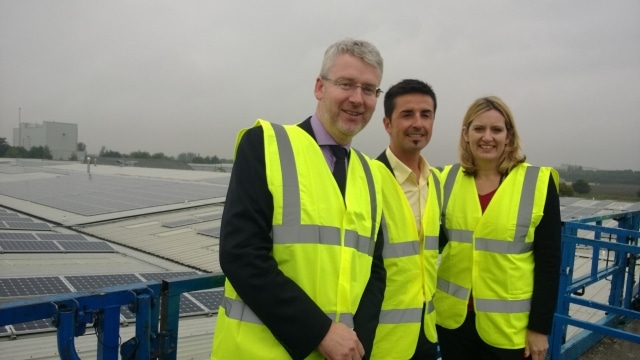Fracking wells will be popping like champagne corks across Britain during the next five years following the promotion of shale gas supporter Amber Rudd to secretary of state for the Department of Energy and Climate Change (DECC).
While green groups have welcomed her position on renewables, oil and gas industry lobbyists have told DeSmog UK they are delighted with the appointment. The shale gas industry has been eagerly awaiting the post-election fracking go-ahead.
Rudd is the UK’s first female energy secretary. She enters the position with a to-do list chock-full of high-priority items including the Paris climate negotiations in December, carbon capture and storage, and nuclear power. But, with Cuadrilla’s impending Lancashire planning application decision due next month, fracking will be one of the first issues Rudd must tackle.
With a majority government, the Conservative party has enthusiastically embraced the prospects for shale gas to provide a domestic source of energy. Following last week’s election outcome, shares in Centrica – which has stakes in North Sea oil as well as UK shale gas exploration – jumped 9 percent.
Business Commitment
Rudd, too, has previously come out in favour of fracking. During a visit to Newcastle this past February she said: “I think fracking is a positive thing to have in the UK, as long as we can do it extremely safely and reassure communities that that’s the case, and I think we can.”
Ken Cronin, chief executive of UKOOG, the representative body for the UK onshore oil and gas industry, welcomed Rudd’s appointment as providing “continuity within DECC.”
“We look forward to working with her and the new Conservative government which, during their last administration, showed a commitment to allowing businesses to explore for oil and gas,” Cronin told DeSmog UK.
Rudd is expected to prioritise shale gas in Britain following chancellor George Osborne’s request to ministers revealed in January to fast-track fracking planning as a “personal priority”. Rudd was parliamentary private secretary to Osborne in 2012.
Lightnight Conductor
Industry activity will undoubtedly speed up in the wake of Rudd’s appointment, predicts Tony Bosworth, energy campaigner at Friends of the Earth, which is calling for a fracking moratorium.
“Fracking will remain a highly controversial local issue,” Bosworth said, speaking with DeSmog UK. “Government and industry want to see progress speed up and will regard next month’s decisions on Cuadrilla’s applications in Lancashire as key.”
Bosworth described Cuadrilla’s push for fracking as “something of a lightning conductor” for industry action.
“They will hope that a positive decision will smooth the path elsewhere,” he said. “But community opposition remains very strong wherever fracking is proposed.”
Critical Events
Beyond Cuadrilla’s planning application in Lancashire, there are several other critical fracking events to watch out for throughout the coming year.
Firstly, Third Energy has applied for planning permission to frack in North Yorkshire. The company is 97 percent owned by Barclays Natural Resource Investments, the bank’s private equity division. This is the first application which, if approved, would see shale gas production as opposed to just exploration.
However, the local impacts of shale gas development remain veiled in secrecy as the government continues to refuse freedom of information requests to release an un-redacted version of the controversial Shale Gas Rural Economy Impacts report.
When asked about the report in January, Rudd said: “Releasing the unredacted draft paper would not help to inform the debate on developing the UK’s shale industry… I do not think it is appropriate for it to be released. It could mislead the public.”
Many are also still waiting for the 14th licensing round for oil and gas exploration to be announced. Bosworth warns that Rudd will face increased resistance to fracking once the licensing round is announced.
This is because there is the potential for whole new regions to be open to drilling licences. However, fracking may be restricted in some areas depending on the definitions of protected areas, which are, as yet, to be set under the Infrastructure Act.
Setting Definitions
This brings us to a third issue quickly approaching: the Infrastructure Act. Having received royal assent in February, many details of the act are due to be decided in June–July. This includes agreeing groundwater safety protection zones (already defined by the Environment Agency) and fracking rules in relation to national parks.
It’s worth recalling what Rudd said previously during one Infrastructure Bill debate: “In the case of areas of outstanding natural beauty and national parks, given their size and dispersion, it might not be practical to guarantee that fracking will not take place under them in all cases without unduly constraining the industry.”
But as Bosworth stressed: “The Government must rule out fracking in any groundwater source protection zones and under, as well as in, national parks and other protected areas.”
He added that the climate change impacts of fracking are also frequently ignored, an issue which may hold significance for Britain’s energy debate in the run up to Paris.
He argued: “There must be a full assessment of the impact of fracking on our national and international climate obligations.”
Photo: Amber Rudd at the launch of Kingspan Energy’s latest solar PV project, DECC via Flickr
Subscribe to our newsletter
Stay up to date with DeSmog news and alerts







